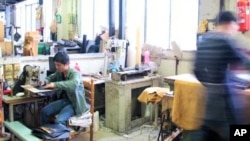An estimated 40,000 Chinese, both legal residents and illegals, are living in the Italian town of Prato, not far from Florence. They constitute a quarter of the town's population and are one of the biggest concentrations of Chinese in Europe. Most come from one town in China, Wenzhou near Shanghai. Nearly all are involved in manufacturing textiles and cheap clothes on a huge scale - producing up to one million garments a day. In recent months, tensions in Prato between Italian residents and the Chinese have spiked with accusations that the migrants aren't playing by the rules.
A simple Italian phrase explains why so many Chinese have come to Prato. It's "Pronto Moda" or Fast Fashion.
A sprawling industrial zone on the edge of town has dyeing factories, workshops and warehouses. From here, cheap clothes made by the Chinese, but with the all-important "Made in Italy" label, are shipped across the world.
Financial journalist Silvia Perrachi has written about how Chinese immigrants have taken over industry in Prato.
"Today, the Chinese industry in Prato actually contains the entire supply chain - from buying the fabrics in China, importing them into Italy, cutting them, dyeing them, assembling the pieces and selling them directly to the retail outlets," Perrachi noted.
When the first Chinese arrived here 30 years ago, they were welcomed as new investors. Now Prato is turning against the Chinese. Once clearly left wing, the town swung to the right and the anti-immigrant Northern League in last year's municipal elections.
Tensions have been escalating ever since a series of police raids on factories allegedly employing illegal immigrants. Authorities say many Chinese are working in sweatshop-like conditions that break European laws, and that many businesses don't pay taxes.
VOA obtained photographs, taken earlier this year inside one factory. None of the factory owners allowed VOA to film in their workshops.
VOA also tried to speak with a distributor. She refused to speak on camera, but said the Chinese community is living in fear.
Prato's Mayor is Roberto Cenni. His family has a long history in textiles. He says the raids were justified.
"The figures from May this year show that we had to close 154 factories for illegal activity," noted Cenni. "And to close a company it means there were illegal activities of a grave nature - criminal acts. So it's clear we need a definitive answer to this situation."
Many Chinese here say the raids were staged to appease right-wing media and politicians. They say they are the victims of discrimination.
Lin Xia has lived in Prato for 20 years and has built a small business empire. He spoke to us in Italian.
"I understand there is a need to regulate this industry, but I'm not happy about the way they're doing it," he said. "For example when they close the factories, it's not being done legally. They arrest the illegal immigrants and release them after a few hours but they aren't allowed back into their homes for a month. So they're left on the street with nothing to eat, nowhere to sleep."
Prato's history in textiles stretches back centuries; it even has a museum devoted to textiles. But as Italian companies have struggled, the Chinese have prospered. Italian businessmen here believe the Chinese are exploiting Prato's reputation.
Maurizio Bonas set up the organization 'Made in Italy' to protect the image of Italian goods. He says every nation must fight to protect its culture.
"We have to defend the factories in Europe," said Bonas. "We have to defend the people who are working here. We must not keep thinking of helping the others and to not see what is happening in our home."
In many ways Prato is a microcosm of the challenges facing Europe: an historic place with proud traditions, now threatened by new ways in a changing world.














